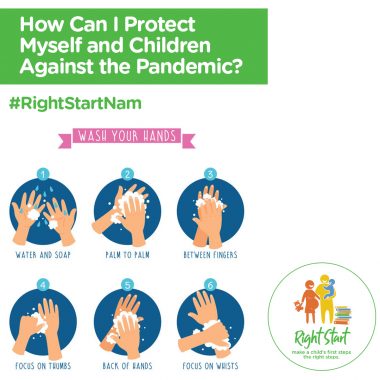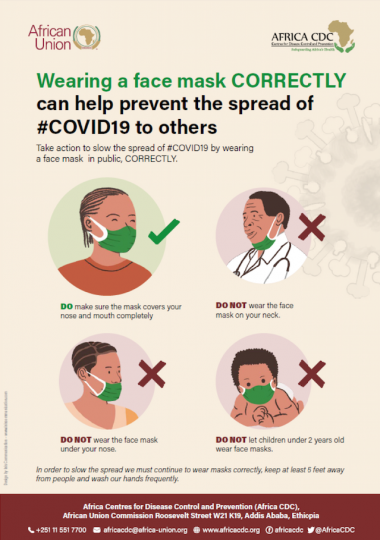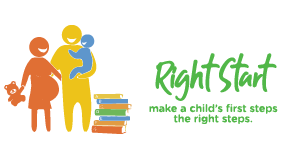Kids and COVID-19: Information Kit
The latest COVID-19 news and resources, as well as tips to protect you and your family.
As the coronavirus has spread, so has misinformation – fueling discrimination and stigma. The Right Start team is working with health experts to promote facts over fear, bringing trustworthy guidance to Namibian parents, caregivers and educators.
24/7 COVID-19 toll free number: 0800100100
- How is COVID-19 spread?
The virus that causes COVID-19 is thought to spread mainly from person to person, mainly through respiratory droplets produced when an infected person coughs, sneezes, or talks. These droplets can land in the mouths or noses of people who are nearby or possibly be inhaled into the lungs. Spread is more likely when people are in close contact with one another (within about 1 meter). There is mounting evidence that the virus can spread through aerosols (exiled air) which makes it important to ventilate the rooms where kids spend a lot of time in a crowded space.
- Can children contract Covid-19?
Yes, while children can contract COVID-19, they may have less severe symptoms than adults, but they can still contract and spread the virus. Children should be encouraged to wear masks (if they are over 2 years) and wash their hands regularly, and practice physical distancing outside of the household.
- Can a pregnant mother pass Covid-19 on to her child?
At this time, there is not enough evidence to determine whether the virus is transmitted from a mother to her baby during pregnancy, or the potential impact this may have on the baby. This is currently being investigated.
Pregnant women are encouraged to follow up on their antenatal care schedules and should continue to follow appropriate precautions as prescribed by a health care provider.
- Is it safe for a mother to breastfeed if she is infected with Covid-19?
Breast milk provides protection against many illnesses and is the best source of nutrition for most infants. In limited studies, COVID-19 has not been detected in breast milk. However, we do not know for sure whether mothers with COVID-19 can spread the virus via breast milk. If you tested positive for Covid-19 and choose to breastfeed directly, wear a facemask and wash your hands before each feeding.
If you tested positive for Covid-19 and choose to pump milk in a bottle, wash hands before touching any part of the pump or bottle, or ask a family member to help you bottle feed the baby.
- What should I do if my child has symptoms of Covid-19?
Symptoms of COVID-19, such as fever, cough or sore throat, can be similar to those of the flu, or the common cold – which are a lot more frequent.
If you are worried that it might actually be Covid-19, do not go to the hospital just yet. Call the Covid-19 call center first at 0800100100 at any time. The staff will provide you with the best advice to follow. Continue to practice regular handwashing, and keep your child up to date with vaccinations – so that your child is protected against other viruses and bacteria causing diseases.
- Should I take my child out of school?
If your child shows symptoms of COVID-19, seek medical care, and follow the instructions from the health care provider. Otherwise, as with other respiratory infections like the flu, keep your child well rested at home for at least 2 weeks, and avoid going to public places, to prevent spread to others.
Parents have the right to keep their children at home if they are not comfortable sending them to school, but learning should continue for children who remain at home. It’s also important to ensure appropriate supervision for children who are out of school, to allow for continued education and also for their protection – from COVID-19, but also other potential threats they may face when left unsupervised. In the resources section of this website, you will find a number of materials to support home-based learning of IECD aged children.
*Source: Coronavirus disease (COVID-19): What parents should know: How to protect yourself and your children. Available at: https://www.unicef.org/stories/novel-coronavirus-outbreak-what-parents-should-know
- How should I talk to my children about COVID-19?
Please see in the documents section – https://www.rightstart.com.na/publications
Pay careful attention to your child if they are displaying the following symptoms:
- Dry cough
- Fever
- Loss of taste or smell
- Diarrhea (in some cases)
- Vomiting
- Headache
- Poor feeding
- Fatigue
Be aware that not all children will have the same symptoms. If your child is displaying the above symptoms, do not go to the hospital. Call the Covid-19 toll free number (0800100100) and explain to them the symptoms your child is displaying and how he/she is feeling. They will advise you on what to do next.
How Can I Protect Myself And My Children From Covid-19?
According to the Ministry of Health and Social Services, everyone should:1. Wash your hands often:
- Wash your hands often with soap and water for at least 20 seconds especially after you have been in a public place, or after blowing your nose, coughing, or sneezing.
- If soap and water are not readily available, use a hand sanitizer that contains at least 70% alcohol. Cover all surfaces of your hands and rub them together until they feel dry;
- Avoid touchingyour eyes, nose, and mouth with unwashed hands.
- Avoid close contact with people who are sick, even inside your home. If possible, maintain 6 meters between the person who is sick and other household members;
- Put distance between yourself and other people outside of your home. Remember that some people without symptoms may be able to spread Coronavirus.
WASH - Water, Sanitation and Hygiene.
Wash your hands for at least 20 seconds with soap and water. If soap and water are not readily available, use a hand sanitizer that contains at least 70% alcohol.

- You could spread COVID-19 to others even if you do not feel sick;
- Face masks should not be placed on young children under age 2, anyone who has trouble breathing, or is unconscious, incapacitated or otherwise unable to remove the mask without assistance;
- If you are around others and do not have on your mask, remember to always cover your mouth and nose with a tissue when you cough or sneeze or use the inside of your elbow and do not spit.
- NOTE: Children under the age of 2 should not wear masks as these are a choking hazard for young children.
- Clean and disinfect frequently touched surfaces daily using household soap and water. This includes tables, doorknobs, light switches, countertops, handles, desks, phones, keyboards, toilets and sinks;
- Be alert for symptoms. Watch for fever, cough, shortness of breath, or other symptoms of COVID-19, epecially important if you are running essential errands, going into the office or workplace, and in settings where it may be difficult to keep a physical distance.

To help parents interact constructively with their children during this time of confinement, these tips for parents cover planning one-on-one time, staying positive, creating a daily routine, avoiding bad behaviour, managing stress, and talking about COVID-19.
- One-on-one time: School shutdown is also a chance to make better relationships with our children and teenagers. One-on-One makes children feel loved and secure and shows them that they are important.
- Keeping positive: It’s hard to feel positive when our kids or teenagers are driving us crazy. We often end up saying “Stop doing that!” But children are much more likely to do what we ask if we give them positive instructions and lots of praise for what they do right.
- Talking about COVID-19: Be willing to talk. They will already have heard something. Silence and secrets do not protect our children. Honesty and openness do. Think about how much they will understand. You know them best.
- Protecting children online:Children and teens are now spending a lot more time online. Being connected helps them reduce the impact of COVID-19 and encourages them to continue with their lives…but it also presents risks and dangers.
- Family budgeting in times of financial stressMillions are stressed about money because of COVID-19. It can make us feel exhausted, angry and distracted. Children or teenagers asking for things can cause arguments. But we can do things to help cope with financial stress.
- Family harmony at homeWhen we model peaceful and loving relationships, our children feel more secure and loved. Positive language, active listening, and empathy help maintain a peaceful and happy family environment under these stressful times.
- Learning through playMillions of children face school closure and isolation in their own home. This tip is about learning through play, something that can be fun for all ages!
Source: Protecting Children During the Covid-19 Pandemic. Available at: https://www.end-violence.org/protecting-children-during-covid-19-outbreak#parenting
All children misbehave. It is normal when children are tired, hungry, afraid, or learning independence. And they can drive us crazy when stuck at home.
Redirect:
- Catch bad behavior early and redirect your kids’ attention from a bad to a good behavior.
- Stop it before it starts! When they start to get restless, you can distract with something interesting or fun: “Come, let’s play a game together!”
Take a pause:
- Feel like screaming? Give yourself a 10-second pause. Breathe in and out slowly five times. Then try to respond in a calmer way. Millions of parents say this helps – A LOT!
Use consequences:
- Consequences help teach our children responsibility for what they do. They also allow discipline that is controlled. This is more effective than hitting or shouting.
- Give your child a choice to follow your instruction before giving them the consequence.
- Try to stay calm when giving the consequence.
- Make sure you can follow through with the consequence. For example, taking away their favourite toy for one hour.
- Once the consequence is over, give your child a chance to do something good, and praise them for it.
Source: Corona virus parenting tips. Available at: https://www.unicef.org/coronavirus/covid-19-parenting-tips#9
With limited access to schools, it can be challenging to find age-appropriate learning material your child can use to keep their brains stimulated. The Right Start team has collaborated with ECD experts to develop these exciting activities to help parents, caregivers and teachers ensure that learning continues even when the child is at home.
Each of the activities is meant to be done over 7 days so that every child completes them at an appropriate pace. Browse through the weekly catalogue on our early learning resources page and select an activity according to the child’s age group. Parents and caregivers are encouraged to help their children complete the activities.
Teach and reinforce everyday preventive actions:
- Parents and caretakers play an important role in teaching children to wash their hands. Explain that hand washing can keep them healthy and stop the virus from spreading to others.
- Be a good role model—if you wash your hands often, they’re more likely to do the same.
- Make handwashing a family activity.
Sanitize or clean surfaces:
- Clean frequently touched surfaces to prevent the germs from spreading. Kids can even help. Doorknobs and light switches, countertops, favorite toys and tech surfaces – keyboards and touchscreens – should all be disinfected regularly.
Help your child stay active:
- Encourage your child to play outdoors—it’s great for physical and mental health. Take a walk with your child or go on a bike ride;
- Use indoor activity breaks (like stretch breaks or dance breaks) throughout the day to help your child stay healthy and focused.
Help your child stay socially connected:
- Reach out to friends and family via phone or video chats;
- Write cards or letters to family members they may not be able to visit.
Help your child cope with stress:
Not all children respond to stress in the same way. Watch out for signs of stress or behaviour changes. Some common changes to watch for include:
- Excessive worry or sadness;
- Unhealthy eating habits;
- Unhealthy sleeping habits;
- Difficulty with attention and concentration.
Source: Helping Children Cope. Available at: https://www.cdc.gov/coronavirus/2019-ncov/daily-life-coping/for-parents.html
Children may worry about themselves, their family, and friends getting ill with COVID-19. Parents, family members, school staff, and other trusted adults can play an important role in helping children make sense of what they hear in a way that is honest, accurate, and reduces anxiety or fear.
- Remain calm: Remember that children will react to both what you say and how you say it. They will pick up cues from the conversations you have with them and with others.
- Reassure children that they are safe: Let them know it is okay if they feel upset. Share with them how you deal with your own stress so that they can learn how to cope from you.
- Make yourself available to listen and to talk: Let children know they can come to you when they have questions.
- Avoid language that might blame othersand lead to stigma.
- Pay attention to what children see or hearon television, radio, or online: Consider reducing the amount of screen time focused on COVID-19. Too much information on one topic can lead to anxiety.
- Provide information that is truthful and appropriate for the age and developmental level of the child: Talk to children about how some stories on COVID-19 on the Internet and social media may be based on rumors and inaccurate information. Children may misinterpret what they hear and can be frightened about something they do not understand.
- Teach children everyday actions to reduce the spread of germs: Remind children to wash their hands frequently and stay away from people who are coughing or sneezing or sick. Also, remind them to cough or sneeze into a tissue or their elbow, then throw the tissue into the trash.
Source: Talking to children about Coronavirus Disease 2019. Available at: https://www.cdc.gov/coronavirus/2019-ncov/daily-life-coping/talking-with-children.html
